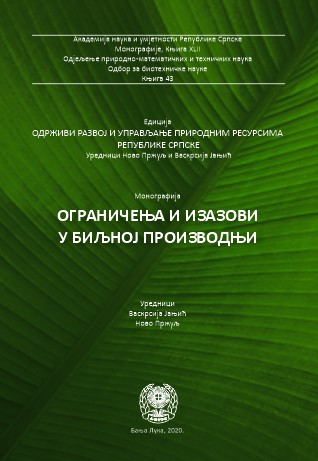Conventional, integrated and organic field crop production systems
DOI:
https://doi.org/10.7251/EORU2003091KKeywords:
Sustainable agriculture, industrial-coventional agriculture, integrated agriculture, organic agriculture, biodynamic agricultureAbstract
Agriculture is usually developed as much and just society where there is a branch of the economy. Today, there are different directions from industry agriculture to many concepts based on ecological principles. Future of agriculture development in the XXI century will imply sustainable agriculture as the alternative to the industrial agriculture. One of the goals of the sustainable agriculture movement is to create farming systems that mitigate or eliminate environmental harms associated with industrial agriculture. That aim can be realized only in flexible cultural practices in real agroecological conditions (different regional characteristics, soil types, adapted cultivars for low-input or organic production). Based on these facts, we must have the right answers in order to mitigate if not to completely eliminate these effects. Agronomic aspect of looking into the problem requires a good knowledge of our crop needs for primary vegetative factors as well as temperature and moisture in conventional agricultural production but and in organic production also too. Agricultural intensification could help alleviate destructive pressure on habitats by meeting agricultural production needs on existing farmland. Those modifications of all cultural practices as well as adequate assortment are necessary for organic crop production. A need for healthier environment and numerous negativities caused by present conventional agriculture have led to the trends of the future development of agriculture based on the complete absence of chemistry, among which is the so-called organic agriculture. Organic production represents the holistic production management system of agricultural, food and other products, which combines a good agricultural practice, high degree of biological diversity (biodiversity), conservation of natural resources, application of high standards of animal welfare and production mode in accordance with the preferences of certain consumers for the products whose production uses natural substances. Today, technological progress in communication, along with the information revolution made possible the revival of such a concept, as well as its applicability on a larger scale. Precision agricultural technologies, such as Global Positioning Systems (GPS), Geographic Information Systems (GIS), remote sensing, yield monitors, and guidance systems for variable rate application, made it possible to manage within-field variation on large scales. The essence of this technology is based upon the availability of data and the use of this data in the decisionmaking process, as well the data integrating influence of different factors on yield and quality parameters. Organic agriculture is one of the most interesting current trends in agriculture completely based on strong ecological principles and the absence of application of agrochemicals (pesticides, fertilizers, hormones), GMO, etc. Organic agriculture is a holistic way of farming: besides production of goods of high quality (better flavour, high content dry matter, vitamins, antioxidants); conservation of the natural resources (soil, water) and richness of biodiversity. Organic farming systems have their important application in field crop production with an extraordinary nutritive and protective role. Important changes will appear in application some cultural practices: soil tillage, crop rotation, fertilization and plant protection. We can expect changes in soil tillage with significant level of reduction; dominate by conservation tillage because of positive influence on soil and saving energy.
